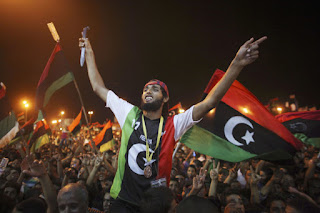
When Defense Secretary Leon Panetta stated last week that Muammar Qaddafi's days were numbered, many news outlets--ourselves included--reported the news with some skepticism. After all, all sides in the conflict had declared imminent victory before, the Libyan leader was as defiant as ever, and the consensus among analysts was that the ragtag rebels faced steep challenges in seizing a relatively quiet and heavily fortified Tripoli.
And then suddenly, on Sunday, the unthinkable happened: rebel fighters poured into the capital with relative ease, swiftly taking control of much of the city (as today's heavy fighting suggests, fully rooting out the regime is proving more difficult).
What was behind the sudden shift in the six-month-old uprising, which observers had long dubbed an intractable stalemate? Let's take a look at some of the most intriguing theories:
Related: The Rebels Advance Toward Tripoli: We've Heard This Story Before- Better NATO Surveillance and Coordination With Rebels American and NATO officials tell The New York Times that the alliance's targeting of Qaddafi's military had recently become more precise as the U.S. used Predator drones to monitor Qaddafi's forces near Tripoli. The sources add that Britain and France, among other nations, dispatched special forces on the ground inside Libya to help train and arm the rebels (this despite NATO's mandate to protect civilians rather than take sides in the conflict). As NATO air strikes gradually wore down the Libyan military's infrastructure and command-and-control structure, the officials explain, the enhanced surveillance and coordination proved lethal for the regime. As a case in point, The Times points to the fact that rebel leaders credited NATO with preventing Qaddafi loyalists from recapturing the strategic city of Zawiyah on Sunday.
- Frenetic NATO Bombing as Deadline Loomed The AP notes that NATO jets hit at least 40 targets in and around Tripoli in the past two days--the highest number on a single geographic location since the bombing began more than five months ago, according to NATO officials. The AP points out that "alliance's military planners have been racing against a deadline next month, when member states must vote on a second three-month extension of the mission," adding that "NATO officials deny there has been a fundamental shift in tactics in recent days to provide close air support to the advancing rebels."
Sleeper Cells in Tripoli Fathi al-Baja, the head of the rebels' political committee, tells the AP that the opposition had been plotting Sunday's offensive for the past three months, collaborating with NATO and dispatching rebel smugglers to arm sleeper cells in Tripoli. On Thursday and Friday, he explains, NATO escalated its strikes on the capital (a comment that supports the NATO bombing theory), and on Saturday--at what the rebels called the "zero hour"--the rebels activated the sleeper cells, sparking protests in the capital. Baha adds that a special battalion guarding the gates of Tripoli surrendered because the unit's commander, whose brother had been executed by Qaddafi years ago, was secretly loyal to the rebellion. Britain's Channel 4 News is also reporting that a dissident group that had been making secret broadcasts and podcasts in Tripoli over the last several months used Twitter and Facebook to give rebel forces map coordinates of pro-government snipers and heavy artillery in the capital.
Related: The Libyan Stalemate Suggested by Google Earth